I stood bleary-eyed at the train station in South Bend, Indiana, glaring at the moon. A pint of paper-bag Coors Banquet, a cheap cigar, and even a twinkle in my bloodshot eyes — I smiled, recognizing a bizarre and unsettling fact: I have not watched an entire year pass anywhere in over twelve years.
Spring to summer and summer to the gales of autumn; frost upon the ryegrass and first snow — overcast to blizzard and hoary blue icicles, the droning doldrums of March and April until the lilacs bud again — in short, a whole year. Foreign to me — a forgotten thing. Instead I’d busied myself with one place after another, never staying long; bike ten or twenty miles, catch the two-hour ferry to mainland; a six-hour bus with a roadside stop at McDonald’s. Accident on I-35 — kitty litter on the blood on the asphalt. Crackheads murmuring at the bus station; a missed transfer, a taxi, a thirty-hour overnight train. A hitchhike in the sun; standing arms raised like a penitent by the highway — I sleep in a ditch, I wordlessly consume a bag of beef jerky, I resurrect myself from a sodden tent on four hours of miserable half-sleep — all to find myself at the train station yet again.
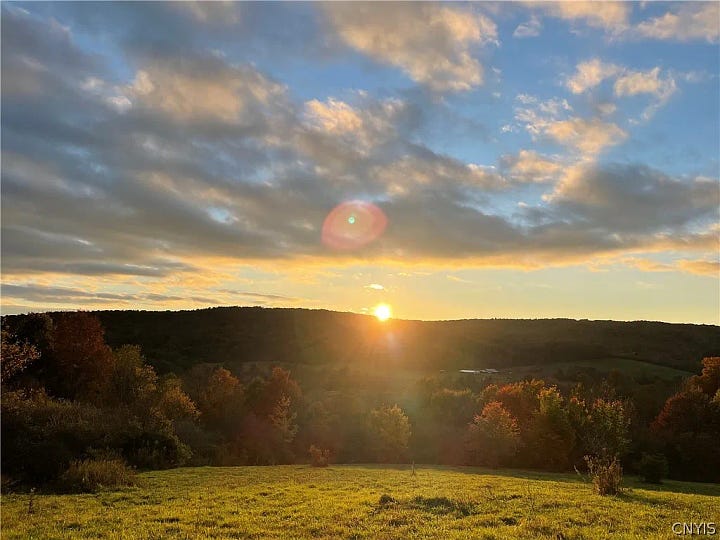
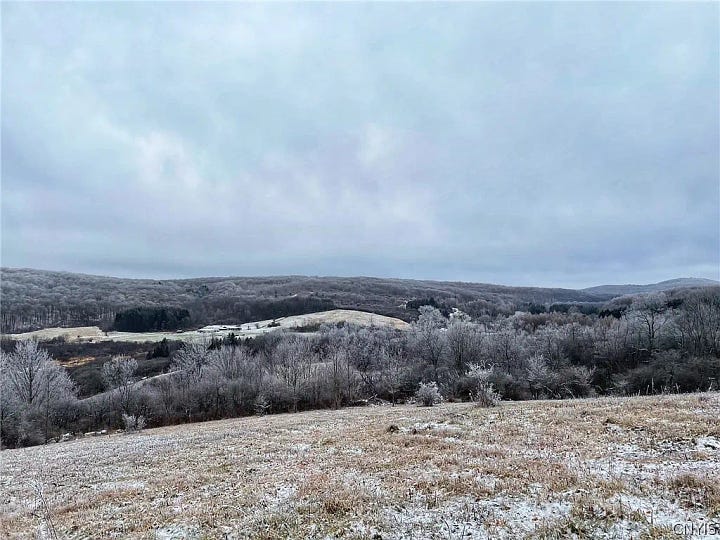
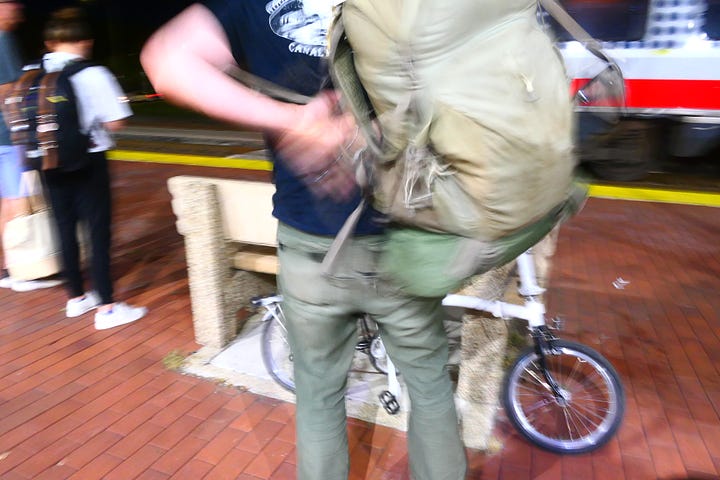
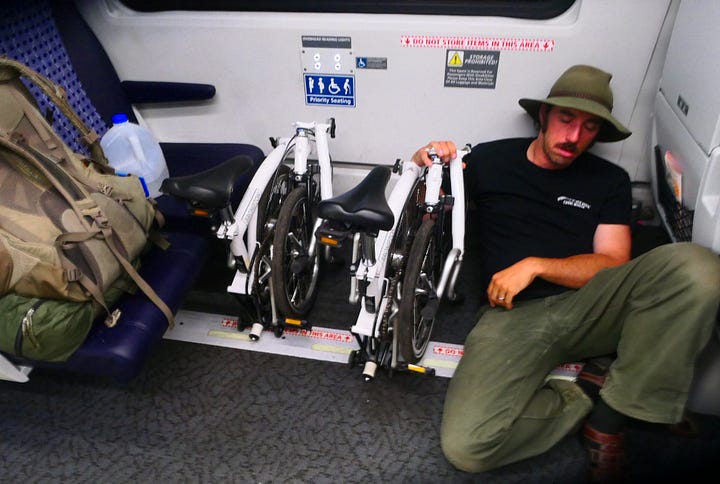
It bleeds the life out of a man like a fast. The muscles ache, the mind is empty; and it is here where a void slips into the brain to make the whole heart ecstatic and ghastly all at once. I stand by the Indiana train station and realize that I am moving far too quickly — and that I have done so for over a decade.
But the station is beautiful to me. Not in the conventional sense, of course — there are no Doric pillars, no marbled benches or fountains or any of the classical Western beauty one finds in our country’s few remaining ‘great stations.’ Instead — a ‘stroad’ with buckling, cracked pavement; needles in the sand, an empty warehouse, SUV’s flying below the lowering railroad gates; a freight train screeching by the neon liquor store and the stinking factory. We are at the far edge of an industrial ghetto; where the moon beams ride low over asbestos-siding homes. Here, dereliction reigns and cigarette smoke hangs over the dirty Cathedral’s rusting gates, and a pedestrian furtively eyes me as he sneaks by.
Somehow, environments like these feel like home to me — for they do not lie at all. No sprinklers run here, no neatly-shaved green lawns sprawl before the houses. The sidewalk is cracked beyond recognition here; the foreheads of men tell of the daily mickey of gin one needs to slog through life, or though what passes for ‘life’ here. Nothing is hidden — the factory’s smoke seeps into the gauzy, ashy windows where Pokemon beach towels serve as curtains. I crack another pint under the fluorescent lights of the station, watching the clouds billow around the moon; tasting the unfiltered version of what this country actually is — and I smile the grim smile of a buzzard who can’t help but linger over the carrion of the American thoroughfares and crumbled-brick backwaters.
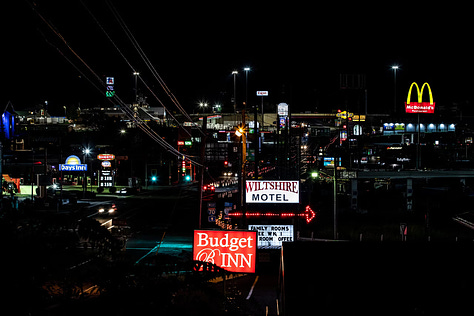
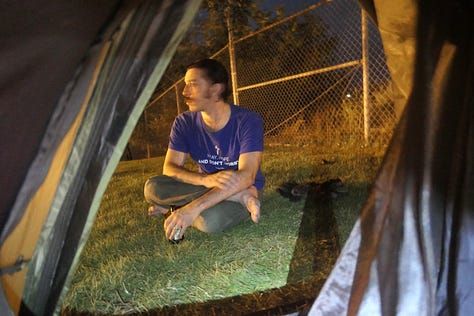
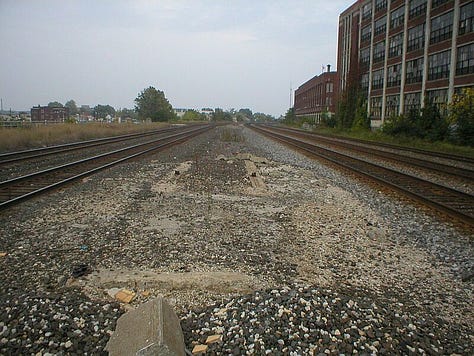
Why go sprinting through country such as this? What purpose could such a hopeless exercise serve? To the untrained observer, it might seem depressing and sad — and no doubt, it is. But just as a fast bleeds the will out of a man, ‘fuzzying’ the edges of his volition for good and for evil — just as his aching hunger throws his sins off their foundation; so too with running. Hard travel is one way to keep the ‘jitters’ off the flesh — it’s a way to beat the shit out of yourself, to run yourself ragged.
For some people, without this exercise in exhaustion — they find themselves staring at the wall, screaming. And so far as I’ve ever been able to tell, what has passed for ‘travel’ in my life has been among the only tools in my quiver that could keep me from such a bleak fate.
As my grandfather used to say about our German Shepherd: A tired dog is a happy dog. And though ‘happy’ is a fickle thing — tired isn’t, and Lord knows this week that I am tired.
By the time we reached our cabin on the far-flung forested island, my body was craving the sleep of death. Most have had this experience: You lay your head upon the pillow and die — and by the time morning’s light spills onto your red, leathery eyelids, you wake; certain that a ten-hour sleep has passed in only minutes. It is as if no time passed at all, and the body feels new.
I did this for three nights at the island’s dark wooden cabin, nestled back far from the shoreline in a grove of hemlocks. The Milky Way spun madly above as I sipped lager in a chair on the porch — and the birds flew into the window like lunatics as I pressed the morning’s coffee. Beef on the grill, books on the shelf, and Rosaries prayed by candlelight in the silent and perfectly dark bedroom — all to revive me and my good wife.
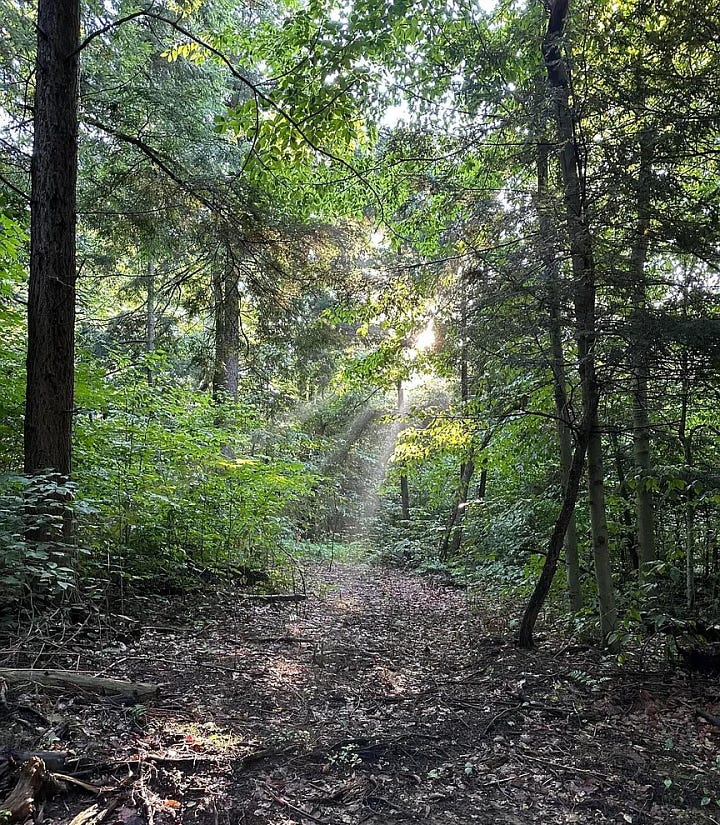
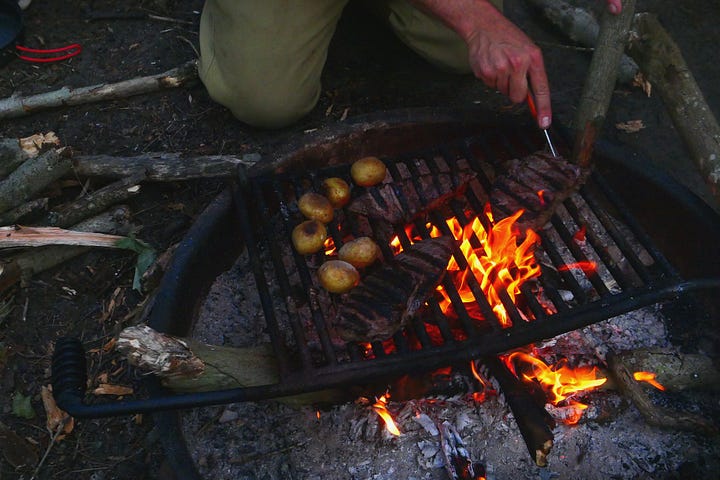
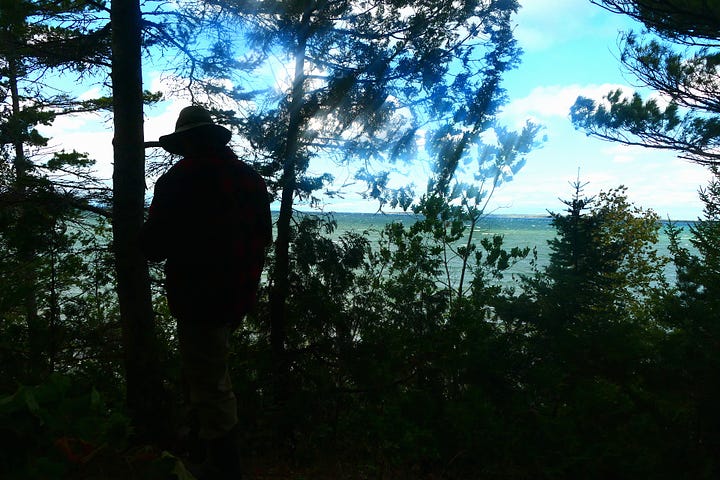
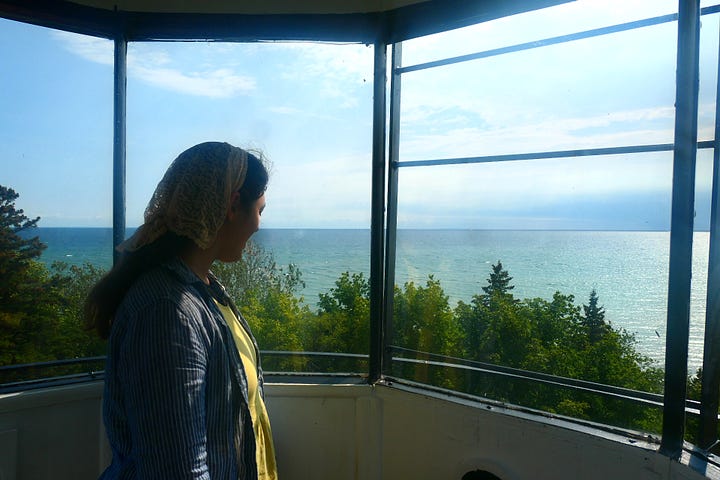
Sitting out on the porch, I looked back at the weeks of travel that led me here: The innkeeper who swore he’d move his family to Russia — for cheap land, “no more woke shit,” and a no-building-codes frontier. The giant, speeding, flagging coach bus nearly blown off the Interstate on the High Plains, piloted by a suicidal-looking, chain-smoking old codger as we fervently prayed to be spared from death. The State Fair — rodeos and Bible readings, Bahai Faith prosletyzers from Wyoming, Mexican troceros slinging sheets of spicy beef jerky — the kid who got mugged in the small-town park by our campsite. The Rocky Mountain compound where meat sat on the counter picked at by the flies and the old busses rusted out in the sagebrush as the children played with knives.
“The Whore of Babylon,” the gas station attendant said of the Catholic Church as I purchased my nicotine pouches. “The Pope is a Communist and a Pagan — to hell with him!” And I smiled, saying “thank you” as I snuck out the door with receipt in hand, offering an Ave in Latin for the old, sad, snarling Baptist woman.
Now I was high on an island, far from the mainland — staring at the HOA’s “members only” signs on the white-sand beach. The waves blasted into the sand; I ignored the sign and buried my body in the icy water like a muskrat, tasting bliss as the waves cracked over my skull. As I rose out of the water, revived, I saw the new construction housing out in the pines above the beachhead — stickers still on the windows. At $600 per square foot, I wondered what it’d be like to be rich.
In truth, I have nothing to offer this week but disconnected threads and vagaries — a random and unorganized buffet of images, notions, and half-baked thoughts. Forgive me if they seem disorganized.
And if I am to be honest, these days, I have something akin to “stage fright” as I think of writing here at Hickman’s Hinterlands — for my readership has exploded in size. I’ve been on the internet long enough to know that whenever you bare your heart to the masses here, someone will not find it to their liking — they may send hate mail, they may unsubscribe, they may tell you to give it up and keep your thoughts to yourself forever. I know beyond any reasonable doubt that I cannot please everyone all the time — especially when you are talking about 8,000 human beings receiving your work in their inboxes, and 33,000 more seeing your short-form thoughts on “X.com.” Now, another 800,000 read them monthly at The Free Press.
In light of these developments, some part of me pines for a wooden shanty on a high hill; for a diet of bread and salt-beef and a life of wordless prayer. “Chain me there,” I think to myself — “let me swear an oath to remain within the boundaries of a single county for a year’s time or more.” I will shoot my laptop with a rifle; I will cancel my telephone plan and get an old rotary telephone in my shed. I’ll fax typewritten essays to my cousin and have him post them here for me — and I’ll correspond with internet friends and readers via snail mail.
Hide me in the oaks and the hollows of heavenly hills, hide me in the good and holy hands of Christ; give me only broth and water and strong black tea — let me tend the fire that it does not go out for an entire year. I will rake the waste in the outhouse flat, and carry the water from the well. No one will know me, save the old buzzards at the Knights of Columbus, and the Priest behind the scrim of the confessional — and the Post Office man and his doddering, unkillable old hound.
Alas, no such luxuries are mine as yet. I have a great deal of work to do — but I know that I must move more slowly or else watch myself unravel. I can feel myself aging: I cannot run like I used to, and perhaps that is a profound blessing. I pray that in spite of my ‘slowing down,’ I am nonetheless able to produce edifying and worthwhile work as I walk.
After all, I am something of a bioregionalist — I cannot deny that there is a palpable metaphysical difference one feels in different watersheds and rock formations. Far be it from me to ramble about “vibes” like a dreadlocked hippie, I can think of no other word but “vibes” to describe it. Sojourn across my home state of New York and tell me that the Tug Hill Plateau and the Hudson Valley are made of the same stuff — but ah, you cannot. Cross the Berkshires into the Pioneer Valley, where Quartz crystal complexes sprawl in under-earth formations; wander down to the New Jersey Pine Barrens and find a different sort of man and song entirely.
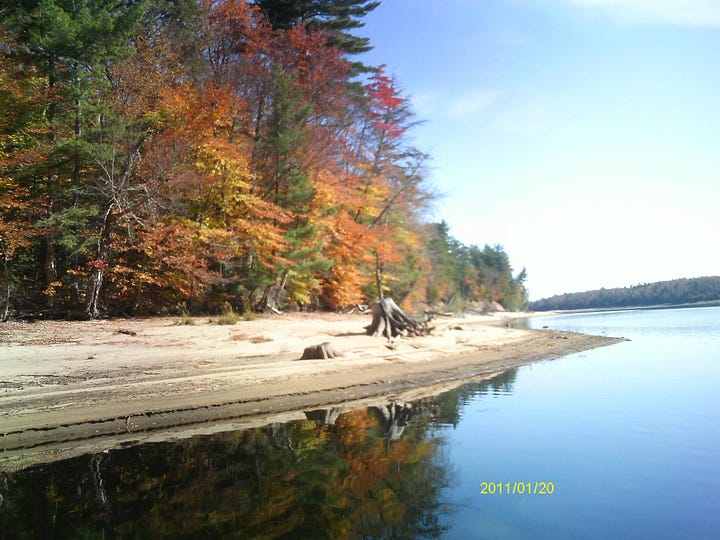
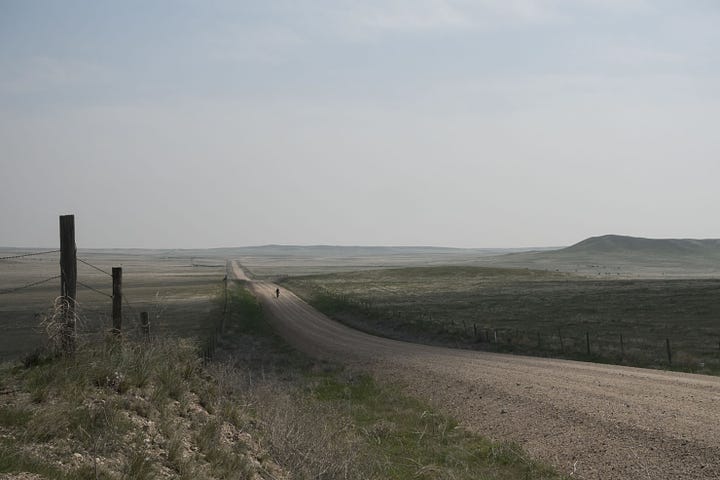
Could it ever be attractive for a traveling man to skip over these subtleties as he makes his way across the earth? There are many who try it — they erratically jet-set around the world by plane to various ‘destinations.’ Glitzy beaches and hotels are their world — ten-thousand of them fly to the same places to make the same videos and ‘content’ and it is all quite the same. In the end, none who travel in this way strike me as being particularly content.
I have often thought that petroleum-based modes of transportation ‘shock’ the spirit of a man such that some part of him is petrified as he goes; what does he leave at the airport or the gas station as he pries his body forward at inhuman speeds? If metaphysics is indeed real and we are not simply the product of random biochemical evolution and nothing more — the soul must be a delicate thing that requires a ginger hand. We fly and accelerate from place to place at our own peril, leaving some shred of ourselves with every departure until we are winnowed down to being an empty vessel. Even the ‘everyman’ in his green-lawned estate, watching Netflix and sloughing through his turnpike commute is more earthly than these sorts of travelers — myself included — for he at least has fidelity to his place, seeing its changes, remaining ensconced in its ‘vibe.’
The only balm for this disorder is found in the feet — in walking. The walker (and indeed, the cyclist and the canoeist) travels over the contours of the land in their wholeness; his soul and body travel at the same pace, and the land sets the pace and meter of their journey. Like sheet music, the topographies of so many valleys and plains and swamps and mountains offer him something to grasp as he goes, and his arrival in new country is not a harrowingly random thing — for he has not teleported there as a piece of cargo but has arrived as an animal arrives in a balanced, sensible, primordial fashion.
Yes, a Trinity — body, soul, and land; the corrective necessary in the lives of all ‘travelers’ in the age of the machine. The three can only strike a resonant chord when the traveler’s will complies with the directive of soul and land; barring this, he will only be stripped down to being a ghost, flying and trapped all at once in the transient world of airports and stations and anonymous rest areas — where men by the thousands constantly pass through, leaving some part of themselves behind.
Footfalls and bread and silence — a man with a stroller packed with tent and blanket and bread, pushing down a country road, singing his prayers by the dawn’s light as he goes; maybe that is the answer. Rolling up the tarp and lacing boots, offering a benediction over the canal fog and the steam of tin-cup coffee — such a traveler’s way is complete and his mind is not screaming cacophonies of exhaustion and jet-fueled displacement at every turn. He wanders through the good world as the eyes wander across a great painting; and while his feet may ache, his heart shall not.
I come back to the man who swore he would move to Russia — the Wyoming innkeeper who stood tall as he declared it in the motel’s tiny office below the stuffed heads of minks and rabbits. Frontier-seekers — quintessentially American in spirit — he and his taxidermist wife spoke of what had been lost with the closing of the American frontier. Perhaps all they sought was the holy trinity of body, soul, and land, all moving in unison and purity — but so far as they could tell, such a heavenly thing was now under threat in the Land of the Free. Even in Alaska — what stops a man from getting “Ruby Ridged” up there, besieged by the ATF, indicted by the IRS, surveilled by the FBI? A paranoia is alive on the brains of so many Americans desperate to find peace of mind.
Can anyone blame them? Dubious as it could be to contemplate a move to Russia — Lord knows many Cold War veterans roll in their grave even as I type these words, and He knows as well how fervently Twitter hated the idea — it is clear that so much of what ever made us Americans in the first place has been plopped on the altar and burned in the name of progress and safety and the common good. These abstractions lay at the bottom of what motivates armies of clipboard-wielding men to bring the weight of the local codes enforcement office down on property owners who commit the mortal sin of building an unpermitted shed — it is all for safety and for the financial welfare of neighboring property-owners. And so it all makes sense; give the devil his due — pay the piper, render unto Caesar, and all will be well.
If you do not, of course, there will be liens and bulldozers and daily fines in the thousands — you will be bruised by the bureaucracy into accepting that there is no frontier left, and the glorious three-in-one of body, soul, and land will be the very thing that upends everything you hold dear. And the case of building codes — those slaughterers of vernacular architecture — is only one example.
Meanwhile — stroads and mini-malls, gas stations leaking effluent and oil into the creek your son swims in, subdivisions called “Pinewood Estates” and “Oakwood Haven” will be erected where oaks and pines once stood. Taxes will increase to pay for schools that tell your sons to wear dresses; neighbors will call you into the hotline when you’ve too many guests for Thanksgiving dinner. And on TikTok — others will share their reasoning for the grim changes, and finally, Putin’s call for Westerners arrives like the news of a haven opened; and you may find yourself contacting the Kremlin.
Or not — perhaps you’ll do the opposite and crusade against “misinformation” online; perhaps to you, the paranoia-industrial-complex is in and of itself the problem. If only we could scour the internet of all of this horrid misinformation, the problem would go away and men the nation over would gladly pay $1000 each month for their property taxes; they would forget ‘frontiers’ and all the macho mythologies surrounding them — and they would pull a permit every time they wish to open their windows on a hot summer night. Of course, I have my doubts there as well.
I have no desire for Russia, no desire to enact UK-style laws to arrest those who share ‘boomer memes’ on Facebook — I rather think the solution is instead a return to body, soul, and land, all moving in accord and lilting together as a single blessed thing. Ora et Labora — prayer and work, God and land, Communion and soil; a ‘univocity’ of spirit found not only in side-by-side toil, but in monthlong walks, and in Sunday morning donuts after Mass.
Three years ago, I spoke at the first annual Catholic Land Movement Conference in Upstate New York — unexpectedly. There at the North American Maryrs Shrine in Auriesville, New York, I felt a tap on my shoulder and soon found myself giving an extemporaneous speech on the subject of “Building Catholic Community” to an audience of about one-hundred souls. Why I’d been chosen to speak of this topic was hard for me to understand — what did I know of community? In those days, I might’ve been the loneliest man in that crowd; having lost countless friends for the crime of going back to Mass — and more still for the crime of serving my country in the United States Coast Guard (two tremendously un-hip decisions). Moreover, I was a drifter, a vagabond, and a sailor familiar only with completely transient environments where ‘community’ was almost always wholly absent or, where present, totally distorted.
Nonetheless I stood tall and spoke as well as I could — and found words rising in my throat that I had not conceived of until they were issuing from my lips. I can scarcely remember what I said — I only remember handshakes and smiles, the warm June air flying about my shocked countenance, and the Rosary beads pressed against my chest in the pocket of my overalls. No one there was playing “who’s who” — no one was elbowing for clout or for glory. There was a unity there; the event was borne of the ‘bioregional’ realities of the land, understood as an expression of God’s great glory; friendships formed and souls were married to one another and the vernal bounty of the landscape, where Nuns played the violin for the children by the fire and men sipped homemade hard cider under the pavilion, swatting mosquitoes.
I left feverish for the idea. For so much of my experience of Catholicism up to that point had been definitively urban — and often enough, I regret to say, tainted by the ‘normative’ religious culture of the United States; where the automobiles in the Church parking lot seemed more sacramental to the congregants than the Liturgy within the Church walls. If I found myself smiling in the company of Catholics, my smile was tentative. Until finding the Catholic Land Movement, I wasn’t sure that I would commune with anyone at Mass except for Jesus Christ, whose true Flesh is present in the Eucharist, and who alone can leaven the burden of a solitary man. And so I was incredibly heartened when I found this jolly, earnest group of families — it seemed as if I might’ve found an ‘answer.’
This week, I found a photograph of some attendees of that event — myself included — on the front page of Avvenire, a magazine for Italian Bishops serving at or near the Vatican. “E' il Catholic Land Movement: comunità che lasciano la città alla ricerca di un rapporto armonioso con la natura e per vivere la propria fede integralmente” — “It is the Catholic Land Movement: communities that leave the city in search of a harmonious relationship with nature and to live their faith fully.”
It appears that we are going global — for in the three years that have passed since the first Catholic Land Movement event since before World War II, not only have CLM chapters formed around the United States — but our message has jumped across the pond to the Vatican. Without question, heads are being turned; though they are turning not simply for the sake of novelty but because there is a ‘market’ for these ideas. Many are hungry for the ‘trinity’ I describe — but not only that of body, soul, and land, but also that of The Father, Son, and Holy Spirit. A marriage of heart and soil; a supernatural back-door out of a world of measurement and pure reason — perhaps what is going on here shows a markedly more reasonable course than moving away to Eastern Russia.
Verily, one can pray the consecration of Russia to the Immaculate Heart of Mary from their farm in Upstate New York; in so doing, they may find themselves on a ‘spiritual frontier’ that could satisfy any urge for what one could find on the vast and isolated taiga.
At midnight, our train arrived on time at the station in South Bend, Indiana, where I’d been drinking and thinking and staring at the moon. The Catholic Land Movement floated along the tributaries of my mind — the idea of walking, of soil and simplicity and the angelic tune of the Sanctus; as I boarded the train I felt a ‘shifting of gears’. Yes, my wife and I are on a fabulous journey around the United States; yes, we are blessed with a readership in whom we find mostly charitable correspondents and often real-life friends — and yes, we will complete our efforts this year not only to strengthen our understanding of this country of ours, and to offer our readers a fresh view of America as she really is, but to love one another more deeply, and ultimately to give ourselves a rudder as we vault upward into the future.
The Future — a celestial and unknowable world that melts on the tongue as one speaks of it. Prophecies of doom are cheap enough there; we hear them almost daily. “Just wait until you have kids — you’ll see!” and “You can’t do this forever!” are a dime-a-dozen. I venture to guess that these statements are made by the same sorts of people who told me that if I tried hitchhiking, no one would pick me up; and when I did get picked up, that I’d get murdered; and when I didn’t get murdered, that I’d die in a ditch like a loser — though of course, that hasn’t happened yet either. Perhaps I could be forgiven for ignoring the litany of warnings that have been issued regarding our life decisions.
The opposite comes to mind, in all truth — a nourishing future; a wholesome life. My wife and I are in the softest kind of love; a love that quells the thirst in a bachelor’s heart, not only in the barest and most mammalian sense but deep within the breast — in the heart and spirit. We have learned that there is a reason why marriage is considered to be a sacrament; for, just as the Eucharist feeds you by dowsing the flame of one’s own fallen will, thereby changing a human heart — marriage does the same; it changes both parties for the better.
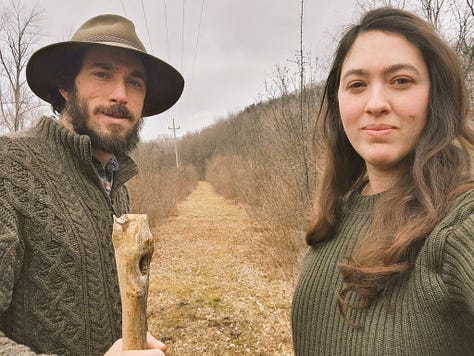
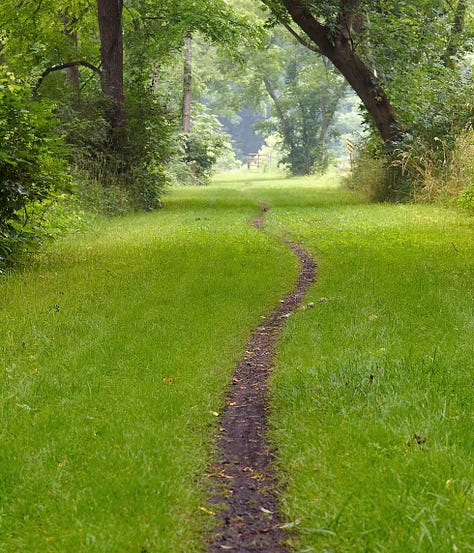
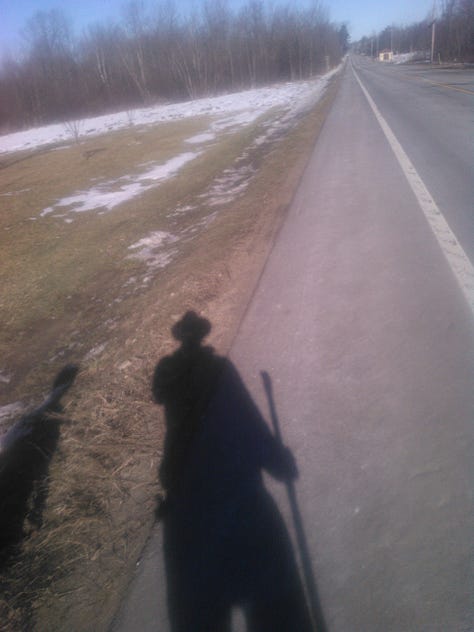
But we must not stop there. The two of us, married to God and His Church, married to the land, married to neighbors with whom we share a resonant view of life’s ultimate purpose — these are the good things which lay in store for us, I am certain.
How can we taste this as we travel? How can we feel the nourishing magnetic pull of the land but by traveling more slowly? Perhaps an experiment is in order the likes of which I have never actually endeavored to do — perhaps we are to use the Amtrak system only sparingly; and once we disembark, to walk slowly, to pedal gently, to move only a few miles here and there, feeling the shift one feels as they crest the hill and venture into the next watershed or mountainside. Perhaps this year I must say “no” to rattling down the rails and roads with eye-blistering speed; drawing my ambitions down to the gentlest and simplest. No transcontinental out-and-back voyages for the mere deviltry of it; no sprinting or running whatsoever. Houseboat owners call it “gunkholing” and perhaps, though we are without a boat, I might employ the same term for our endeavors.
Imagine walking five-hundred, six-hundred, a thousand miles. Though such a feat would prove to be physically strenuous — there is a certain comfort found in the routine one would possess as they traveled in this manner. Awaken at dawn below a dew-soaked tarp; light the camp stove, make tea, pray, lace boots and tighten belts, boil eggs, and fill the stroller with one’s sundries and gear. Then: One foot before the next as the sun flies upward, stopping to talk to whomever is around, slipping into stores and cafes where one finds them, stumbling into Church suppers and bingo halls. Finally, string up the tarp again as the sun hangs low — and sleep, that you may repeat the cycle again.
To move in this way would strike the balance between penance and self-destruction. One would be wrong to tell a man that he must ravage himself body and soul for the sake of his sins; that he must bloody himself, despise himself, render himself into a weeping bag of bones for the sins he carries in his heart. Such a thing would do nothing for him — it would only be an exercise in hopeless vanity. Instead, penance is a quiet thing; a bloodless offering of all a man bears in his soul and spirit to God above. He fasts, he walks, he prays, he abstains — not to punish himself but to emphasize the simplicity of his being. Rich foods and idle days; wine and shorter prayers — these can be satisfactory in life, and even edifying; but to forego them for a time and to offer up what one lets go of is, hopefully, to emphasize the serious possibility of forgiveness and repentance — and ultimately, to be born anew, as fresh as an infant.
The traveler’s guide to penance is much the same: if one is tempted to sprint across the face of the earth to quell his darkness and the crawling under his skin, he must chasten himself and throw such urges away. Gentler he must go; refining his modes and methods to be simpler and cleaner — that the hopeful element contained within them might not be crushed under the weight of his zeal for silence in his heart as he runs. Acceptance — that the flesh of man need not fly as demons fly unto death; but that if he might pause between his quiet footfalls, hope may sprout upon the trail on which he travels, and he may know peace.
Often, perhaps, those who confuse penance and self-destruction are simply perfectionists who seek the most radical and complete tempest for their various ills. With all the specificity and meticulousness of German engineers, they contrive to whip the darkness and sloth from their flesh by the most totalizing and efficient method they can imagine — high-speed sprinting, coast-to-coast madness, thousand-mile days, sleepless delirium. But there seems to be what I call a “tyranny of high standards” that ravages the hearts of men not only in the domains of travel and penance but in almost every territory of human life. We are tempted to insist upon the best, the most complete; we feel a call to ‘go for the gold,’ and for this, we get the idea that we must ‘grind hard’ in order to get there.
Understandable though this urge may be, it strikes me as being mistaken at day’s end. Though there is a national prejudice against lowering one’s standards, it is this exact ‘lowering’ that strangely enough improves one’s life and raises them to a higher place. For as long as man’s will is fallen — and verily, it is — one cannot whip the fall from themselves no matter how hard they try. There is no way to grab oneself by the shoulders and shake completely loose from sin and death. Like a splintered tree, we find ourselves growing in wayward form; wandering from the well-ordered grain that characterizes life on earth — and no matter how much the splintered log of a tree-trunk is ravaged by heavy winds and so much shaking, its lack of congruity with the tree’s grain will not be cured.
Instead, it takes a soft hand to graft the wood back to its home-place; and even then, there will always be some separation that remains. If the separation is healed, the wayward chunk of the tree-trunk will not know it; it will always labor under the fear that it has taken a wrong turn, forever. But that soft hand is the hope; the ginger hand of the good arborist leads him as close to home as he can imagine, and part of the wayward branch’s mantle may be to make his peace with the imperfections of this fix. One must learn to say “good enough,” without even the slightest breath of cynicism or fatalism. One must learn to say “good enough” with hope in their heart.
And this is the walker’s task. For days may pass him by where he sees no breathtaking vistas; where he meets no one of interest and only endures long miles for the paltry reward of rough sleep. Icy rain and desert scorch; wind and wild dogs — but at day’s end, if he is attentive to his heart and the land on which he plods so dutifully, he will say “good enough” for today, and he will smile.
It is that smile I am after, and if I find it, I shall share it with you here. God bless you.




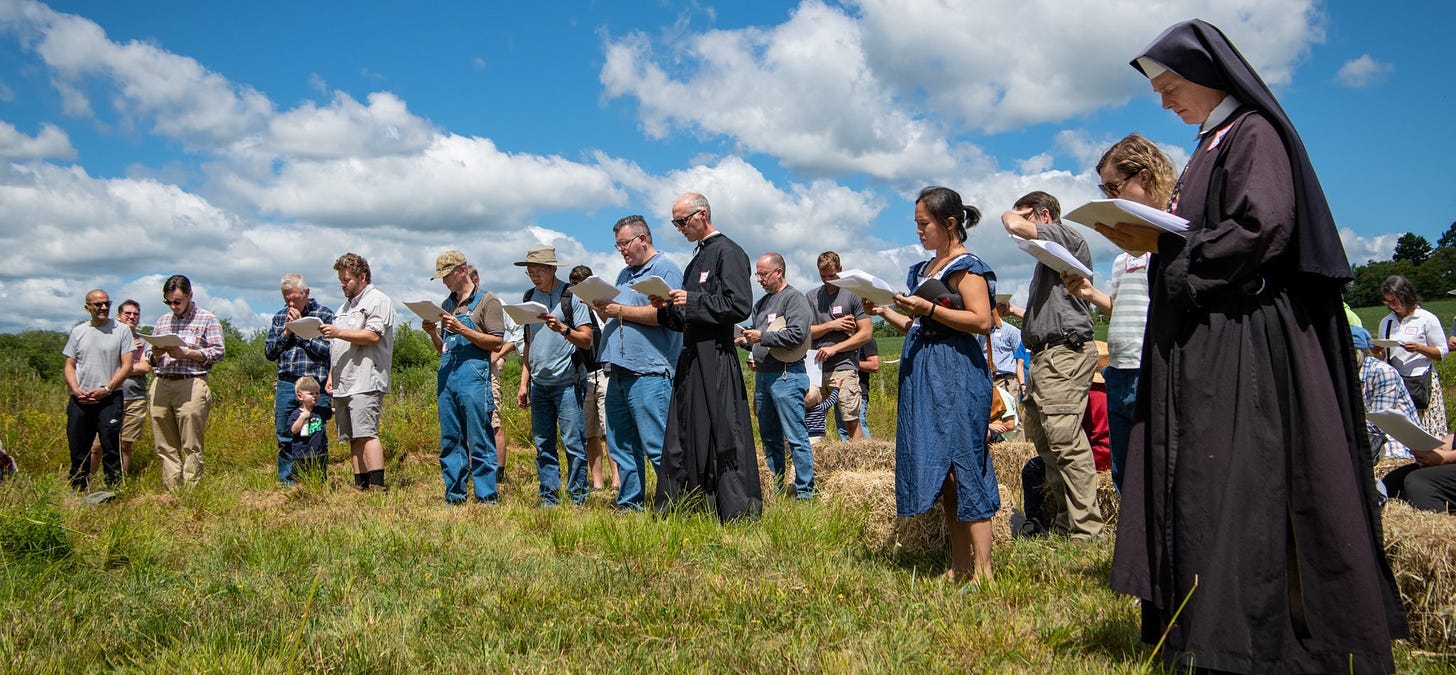
Please take care of yourselves in your travels. I need these periodic infusions of wonder and beauty. God Bless.
Good enough is good enough. It took me a really long time to get there.
I'm recovery, we record the full Serenity Prayer, but the line I despise has become my favorite. "Reasonably happy in this life and supremely happy with G*d forever in the next."
I would refuse to utter the words "reasonably happy" because I figured that if I wasn't "completely happy,"I was doing something wrong or not trying hard enough.
Then an epiphany... "Good enough REALLY is good enough." Suddenly, the concept of Serenity was attainable and understandable. So, yes...fellow "Hickman," you speak the truth here...
"One must learn to say 'good enough,' without even the slightest breath of cynicism or fatalism. One must learn to say 'good enough' with hope in their heart."